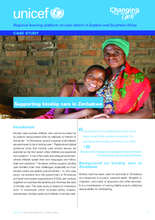Kinship care involves children who cannot be cared for by parents being looked after by relatives or friends of the family. In Zimbabwe, around a quarter of all children are estimated to be in kinship care. Regional and global guidance state that kinship care should always be explored as the first option when children are separated from parents. It can offer a safe and caring environment, where children speak their own languages and follow their own traditions. However, without support, kinship care families often face challenges, especially as most kinship carers are elderly grandmothers.
In this case study, the authors explore how the government of Zimbabwe and local civil society organisations (CSOs) are working together to maximise the benefits and minimise the risks of kinship care. The case study is based on interviews with 12 individuals which included policy makers, practitioners, kinship carers and children in kinship care.

